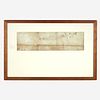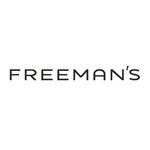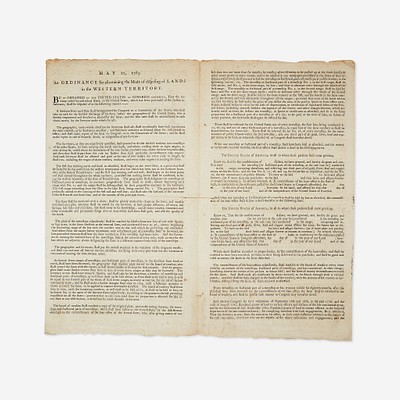[Pennsylvania] Logan, James Land Patent, signed
About Seller
2400 Market St
Philadelphia, PA 19147
United States
Established in 1805, Freeman’s Auction House holds tradition close, with a progressive mind-set towards marketing and promotion, along with access to a team of top experts in the auction business. And now with offices in New England, the Southeast, and on the West Coast, it has never been easier to ...Read more
Two ways to bid:
- Leave a max absentee bid and the platform will bid on your behalf up to your maximum bid during the live auction.
- Bid live during the auction and your bids will be submitted real-time to the auctioneer.
Bid Increments
| Price | Bid Increment |
|---|---|
| $0 | $25 |
| $500 | $50 |
| $1,000 | $100 |
| $2,000 | $200 |
| $3,000 | $250 |
| $5,000 | $500 |
| $10,000 | $1,000 |
| $20,000 | $2,000 |
| $30,000 | $2,500 |
| $50,000 | $5,000 |
| $100,000 | $10,000 |
About Auction
Feb 17, 2022
Freeman’s February 17 Books and Manuscripts auction is an Americana collector’s delight, with highlights led by an extremely rare Northwest Territory Land Ordinance from 1785. Curated by Darren WInston, Head of the Books and Manuscripts Department at Freeman's. Freeman's info@freemansauction.com
- Lot Description
[Pennsylvania] Logan, James Land Patent, signed
Philadelphia, September 10, 1712. Manuscript land patent on vellum in a secretarial hand, signed by colonial deputies James Logan, as Receiver-General, Samuel Carpenter, as Provincial Treasurer, Richard Hill, as Mayor of Philadelphia, and Isaac Norris, granting Daniel Hierre and Isaac Lefevre 2,000 acres of land east of Conestoga near the head of the Pequea Creek, in present-day Lancaster County. Affixed with the large wax Great Seal of the Province; further inscribed on verso by Logan affirming the payment in full from Hierre and Lefevre for the patented land. Creased from original folds; some small restoration to wax seal; signatures somewhat faded; three small holes at top of vellum affecting a few words. Unexamined out of fine double-pane frame, 20 1/4 x 31 1/4 in. (514 x 794 mm).
A fine and large land patent for 2,000 acres, issued to French Huguenot settlers, Isaac Lefevre and Daniel Hierre, in current-day Lancaster County, Pennsylvania. The 2,000 acres of land was parceled out of the original 10,000 acres warranted by the Province in August 1710 to some of the first European settlers in the area, the Kendig, Mylin, Herr, Bowman, Miller, Franciscus, and Funk families. The Hierre and Lefevre families were a part of the second wave of mostly French Huguenot settlers to move into the area around 1712, fleeing persecution in France after the revocation of the Edict of Nantes that made Protestantism illegal. During the reign of Louis XIV thousands of Protestant families fled to neighboring countries like Germany and England, before emigrating to North America. Isaac Lefevre and his wife Catherine were granted passage from Steinweiler, Germany to North America in 1708, via Holland and England. They arrived in New York in 1709 and settled in a Hueguenot settlement at Esopus, New York, before moving south to the Delaware Valley.
- Shipping Info
-
No lot may be removed from Freeman’s premises until the buyer has paid in full the purchase price therefor including Buyer’s Premium or has satisfied such terms that Freeman’s, in its sole discretion, shall require. Subject to the foregoing, all Property shall be paid for and removed by the buyer at his/ her expense within ten (10) days of sale and, if not so removed, may be sold by Freeman’s, or sent by Freeman’s to a third-party storage facility, at the sole risk and charge of the buyer(s), and Freeman’s may prohibit the buyer from participating, directly or indirectly, as a bidder or buyer in any future sale or sales. In addition to other remedies available to Freeman’s by law, Freeman’s reserves the right to impose a late charge of 1.5% per month of the total purchase price on any balance remaining ten (10) days after the day of sale. If Property is not removed by the buyer within ten (10) days, a handling charge of 2% of the total purchase price per month from the tenth day after the sale until removal by the buyer shall be payable to Freeman’s by the buyer. Freeman’s will not be responsible for any loss, damage, theft, or otherwise responsible for any goods left in Freeman’s possession after ten (10) days. If the foregoing conditions or any applicable provisions of law are not complied with, in addition to other remedies available to Freeman’s and the Consignor (including without limitation the right to hold the buyer(s) liable for the bid price) Freeman’s, at its option, may either cancel the sale, retaining as liquidated damages all payments made by the buyer(s), or resell the property. In such event, the buyer(s) shall remain liable for any deficiency in the original purchase price and will also be responsible for all costs, including warehousing, the expense of the ultimate sale, and Freeman’s commission at its regular rates together with all related and incidental charges, including legal fees. Payment is a precondition to removal. Payment shall be by cash, certified check or similar bank draft, or any other method approved by Freeman’s. Checks will not be deemed to constitute payment until cleared. Any exceptions must be made upon Freeman’s written approval of credit prior to sale. In addition, a defaulting buyer will be deemed to have granted and assigned to Freeman’s, a continuing security interest of first priority in any property or money of, or owing to such buyer in Freeman’ possession, and Freeman’s may retain and apply such property or money as collateral security for the obligations due to Freeman’s. Freeman’s shall have all of the rights accorded a secured party under the Pennsylvania Uniform Commercial Code.
-
- Buyer's Premium



 EUR
EUR CAD
CAD AUD
AUD GBP
GBP MXN
MXN HKD
HKD CNY
CNY MYR
MYR SEK
SEK SGD
SGD CHF
CHF THB
THB![[Pennsylvania] Logan, James Land Patent, signed](https://s1.img.bidsquare.com/item/l/1094/10945335.jpeg?t=1NcmVe)
![[Pennsylvania] Logan, James Land Patent, signed](https://s1.img.bidsquare.com/item/s/1094/10945335.jpeg?t=1NcmVe)











